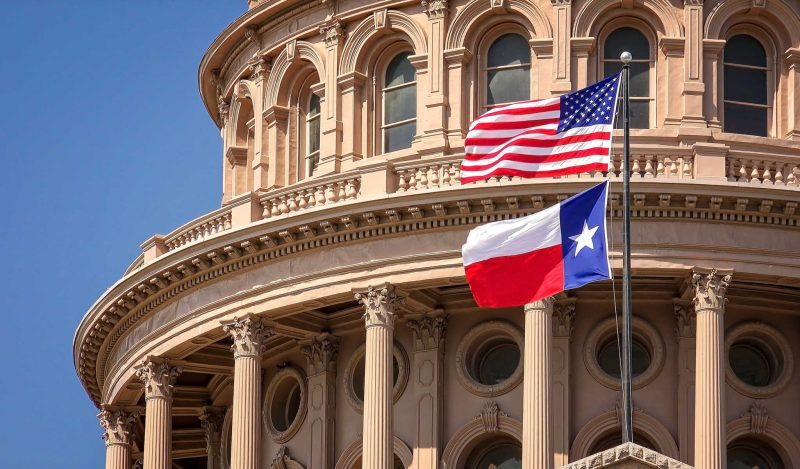Earlier in the week, I was asked by Rebecca Hardy of Texans for Vaccine Choice if I could fly to Austin at the last minute to give invited testimony on a number of COVID-related bills up for consideration by the Senate Health & Human Services Committee at the Texas Senate.
I had previously testified to the same Texas Senate committee during June of 2022, predicting among other things that the “boosters” as then planned would cause more harm than good (highlighting “immune imprinting”), and apparently made a positive impression for forthrightness, comprehension and integrity. I was advised that the situation was urgent.
So, how could I say no to volunteering my time and resources for such an important cause? Unfortunately, for government testimony, there is no re-reimbursement for airfare or hotel, just a whole lot of gratitude. Jill booked me on a early morning flight for Wednesday and off I went.
I got at the State house around 11:00 AM, registered and then a long day commenced.
Each bill was presented. Then invited testimony was taken, then public testimony. The process was long and more than once I wished that 1) I had more coffee on board and 2) I had been able to find time to eat that morning! Fortunately, Rebecca had stocked up on snacks and kindly kept my blood sugar up throughout the day.
The testimony wrapped up around 8:00 PM.
Each bill that I testified on is listed below, and there is a link to the actual text. This is followed by a brief summary description and then my initial notes of the issues of each bill as they were currently written (strengths and weaknesses). My notes about each bill are in italics.
This testimony was about clarifying and making this legislation more precise and correct, before the bills get voted on (hopefully next week).
(My notes below show the level of detail and rigor that must go into each and every bill. This is truly about how the “sausage gets made.”)
SB 177 (Sen. Middleton): Relating to informed consent before the provision of certain medical treatments involving COVID-19 vaccination.
Scope: The important role played by informed consent in the patient-provider relationship.
<RWM- I strongly support this well written bill>
<RWM- I have some reservations in that this bill is restricted to COVID-19 vaccination, and in my opinion should apply to all medical procedures>
<RWM- recommend amendment of language to read “compel, coerce or entice” to bring this language into alignment with current norms in the bioethics of informed consent. Examples of enticement would include financial incentives or provision of gifts, goods or services of sufficient value to cause a patient to accept a medical procedure which they might otherwise not accept.>
SB 299 (Sen. Hall): Relating to health care services provided at a hospital by a physician who is not a member of the hospital’s medical staff and the hospital’s liability for health care services provided by such a physician.
Scope: Patients’ right to choose preferred physicians.
<RWM- “hospital shall allow a Texas licensed physician…”>
SB 301 (Sen. Hall): Relating to prescribing, dispensing, administering, or otherwise providing ivermectin or hydroxychloroquine sulfate.
Scope: Healthcare providers and pharmacists have a right and duty to direct individualized care for COVID-19 patients without risk of complaint or state intervention.
Prohibits disciplinary action against health care providers and pharmacists for prescribing or dispensing these agents <RWM: for any purpose>.
SB 403 (Sen. Springer): Relating to a study on the side effects, adverse reactions, including death, and the effectiveness of vaccines against the SARS-CoV-2 virus (COVID-19) or its variants.
Scope: Studies have their place but they are only as good as their methodologies and they do not advance medical liberty policy. The intent of the bill is good but it cannot stand alone; it will need to be passed along with strong policy bills in order to fulfill its goal of providing transparency and strengthening informed consent.
Relates to a study on the side effects, adverse reactions, including death, and the effectiveness of vaccines against the SARS-CoV-2 virus (COVID-19) or its variants.
<RWM- nomenclature- effectiveness = field effectiveness in the general population, typically measured epidemiologically, efficacy = measured outcome effects in a structured clinical trial>
<RWM- nomenclature – “A “Vaccine” means a substance used to stimulate immunity to a particular infectious disease or pathogen.” Recommend that “immunity” be further defined as prevention of infection, replication and spread of a pathogen, and includes some threshold such as “in a minimum of 50% of recipients”>
This bill proposes that the executive commissioner of the State of TX HHS commission undertake an effectiveness and safety assessment (including short-term, long-term, expected and unexpected adverse reactions) of currently available COVID-19 vaccines, as well as any misrepresentations by manufacturers and any government agency.
Under this bill, the executive commissioner will also study and opine on potential concealment of information concerning effectiveness or “dangers” of these products.
<RWM- consider whether the newly introduced term “dangers” is advisable vs previously defined “adverse reactions,” recognizing that “adverse reactions” requires a subjective assessment of causal relatedness, whereas “adverse events” does not imply causation.>
SB403 requires a report and recommendations to reduce prevalence of vaccine “side effects.”
<RWM- another nomenclature issue- “side effects” is another newly introduced and previously undefined term. May wish to stick with “adverse events”>
SB403 anticipates receipt of “gifts” to support the required reporting activities.
<RWM- recommend consideration of COI and disclosure requirements relating to any such “gifts”>
SB 426 (Sen. Paxton): Relating to patient access to prescription drugs for off-label use for COVID-19 treatment.
Scope: Healthcare providers and pharmacists have a right and duty to direct individualized care for COVID-19 patients without risk of complaint or state intervention.
Regarding Off-label drug use for COVID-19 treatment, “Right to treat act”
<RWM- note that this act would permit direct dispensing of pharmaceuticals by physicians. A concern. Not clear if this alters current policies and practices relating to the relationship between physicians and pharmacists in State of TX.>
<RWM- the legislature may wish to consider including a clause reinforcing the requirement for any physician so prescribing, administering, or dispensing for off-label use a prescription drug to treat a patient who is exposed to or diagnosed with COVID-19 to provide and document patient informed consent as required by federal law for off-label use of agents otherwise authorized for interstate marketing by the FDA.>
<RWM- the legislature may wish to consider the example of post-COVID vaccination syndrome in addition to treatment of the primary disease, and to provide a “Right to treat” for this syndrome.>
Sec.A490.005.AA PROHIBITED ACTION AGAINST PHYSICIAN ’S LICENSE.
<RWM- inclusion of this clause “provided the physician’s treatment of the patient meets the medical standard of care” does not resolve the potential liability trap which physicians face when treating either COVID-19 or post vaccination syndrome. As the knowledge and best practices for such treatment continue to develop, individual physicians may acquire knowledge and expertise in treating related syndromes and disease which are advanced relative to the surrounding general medical community – and would therefore not meet local medical standard of care as currently defined. Inclusion of this clause at a time when treatment protocols continue to develop will create a barrier to medical innovation. In general, “right to treat,” in a manner akin to “right to try” statutes, are more unrestricted, and primarily rely on the documentation of full and complete informed consent to accept the medical intervention by the patient.>
SB 1024 (Chairwoman Kolkhorst): an omnibus bill relating to preventative health care and public health; establishes a state-run VAERS; authorizing a civil penalty.
Scope: The unethical practice of denying care based on vaccination status, inefficiencies in federal VAERS date, benefit of having state VAERS database.
An act relating to preventative health care and public health; authorizing a civil penalty.
Section 38.001, Education Code, relating to immunizations required for public school admissions.
Deletes current required immunization list, indicates that (on an annual basis) Department of State Health Services shall prepare a list of the immunizations required [under this section] for admission to public schools.
<RWM- it may be useful to define “immunizations,” so as to incorporate a performance or outcome requirement, ergo “immunization with a medical product which provides protection against infection, replication, and spread of the infectious disease in at least 75% of recipients.” Such a clause should reflect the general objective of achieving herd immunity in the immunized population, as that is the intended function and purpose of a school immunization requirement.>
Prohibits public school requirement for vaccination against COVID-19.
<RWM- lack of specificity in this opening regarding publicly funded higher education requirements for vaccination, higher education is covered separately in SECTIONA4.AASection 51.933, Education Code, proposed b-1. And b-2. Will these modifications also apply to pre-school and head start programs?>
Prohibits private school (including higher educational institutions) requirement in State of TX of COVID-19 vaccination as condition for admission or continued enrollment.
<RWM- there are reports of educational institutional-associated extra-curricular activity requirements for COVID-19 vaccination even when the host institution no longer requires COVID-19 vaccination. The committee should consider whether to address this possible loophole.>
Allowance for requirement for vaccination against hepatitis B, measles, rabies, varicella.
Specific clause for Hepatitis B vaccination when curriculum involves potential exposure to blood or body fluids from human or animal.
Section 5; Sections 81.023(a) and (c) includes optional legislature reporting clause for immunizations.
<RWM- what is the intent with this clause? Does legislature anticipate an oversight, review and approval process? If so, shouldn’t this reporting be mandatory?>
SECTION A7. Subchapter A, Chapter 161, Health and Safety
Code, is amended by adding Sections 161.0086 and 161.0087 to read as
follows:
Sec.A161.0086.AA ADVERSE EVENT REPORTING SYSTEM FOR VACCINES
AND BOOSTER DOSES.
Establishes a Texas state adverse event reporting system for educationally-required vaccines.
Includes required reporting (“shall”) compliance for any adverse event, whether or not determined to be vaccine related.
<RWM- as discussed with SB 265, compliance with these clauses will require considerable effort and rigor. While the data to be generated could greatly advance and clarify understanding of immunization risks, the usefulness of the data will be a function of the rigor of capture. To do this well will require substantial infrastructure and capabilities as previously discussed.>
SUBCHAPTER X. PROHIBITION ON MANDATED PREVENTATIVE CARE
Sec.A161.701.AAPROHIBITION ON FACE MASK REQUIREMENT.
<RWM- while particle masks are not effective in preventing spread of coronaviruses, influenza A viruses, and other small RNA viruses, they may be partially effective in the context of some bacterial, fungal, mycoplasma or unknown future biothreat which is primarily transmitted via larger fomites formed during coughing or other activities. Recommend consideration of a clause permitting waiving of this clause by a designated officer or with legislative authorization in the event of compelling evidence of effectiveness in preventing transmission of some future unknown infectious disease.>
CHAPTER 174. PATIENT RIGHTS
Prohibits hospital discrimination based on vaccine status.
<RWM- nomenclature: vaccine status or immunization status. Defined as acceptance of a medical product or functionally as evidence of protective immune response?>
Prohibits employment discrimination based on COVID-19 “vaccination” status.
<RWM- see above>
SB 1583 (Sen. Hall): Relating to prohibiting institutions of higher education or entities receiving public funds from conducting gain of function research on potentially pandemic pathogens in this state; creating a civil penalty.
<RWM- recommend adding term “directed evolution” to prohibited scope>
<RWM- preponderance of evidence favors SARS-CoV-2 being a product of “directed evolution” or “gain of function” research. Investigative journalism disclosures published in STAT news describe ongoing “directed evolution” or “gain of function” research at a Texas university in collaboration/cooperation with the Pfizer Pearl River, NY facilities.>
RE: Sec.A158.002.AA DEFINITION OF POTENTIALLY PANDEMIC PATHOGEN.
<RWM- recommend expanding scope to include veterinary/animal health/livestock in addition to human potential pandemic pathogens.>
<RWM- recommend consideration of insurance or bond indemnification requirement to compensate potential damages in the event that the research results in harm to individuals or the general public.>
SB 265 (Sen. Perry):
Relating to required reports of certain vaccine-related or drug-related injuries and adverse events.
Proposed amendment to Subchapter A, Chapter 161, Health and Safety Code
Relating to required vaccine-related adverse event reporting
Applicable only to experimental, investigational, or FDA EUA Authorized products
<RWM -recommend modification to read HHS EUA Authorized products, as EUA authorization is granted by the Secretary of HHS>
Requires reporting of
1) each potential vaccine-related injury of a patient the physician treats
2) an adverse event following the patient’s vaccination
<RWM- Compliance will require implementation of rigorous follow up procedures. There are two general categories of applicable adverse events recognized during clinical research; solicited and unsolicited. Capturing and recording of “solicited” adverse events generally requires methodical use of a questionnaire together with a direct contact with a medical care provider or call center. Capturing “unsolicited” adverse events generally involves a combination of a diary (electronic or paper) with scheduled submission and review by a medical care provider. Details of standard practices in this regard are well known by clinical research specialists and specialist organizations.
Performance of such follow up identification and reporting of adverse events, as well as categorization (mild, moderate, severe; unrelated, possibly, probably related to the experimental treatment; expected or unexpected), is typically a required standard practice during clinical research. As “experimental, investigational, or FDA EUA Authorized products” are all examples of medical products which are functionally experimental (ergo, not market authorized), this proposed amendment is consistent with good clinical practice guidelines for administration of investigational (experimental) products.
In general, this bill will place a significant burden on physicians to perform post-vaccination follow up with all patients.
An option to reduce this burden on practicing physicians would be to develop approved standards and processes for third-party (ergo contract clinical research organizations) performance of the required post-vaccination surveillance. This would typically require financial capital, which is typically provided by the “sponsor” of the investigational product. In the case of HHS authorized EUA products, the sponsor is functionally the USG HHS, and so in this case reporting expenses should be compensated/provided by USG HHS.>
SECTIONA2.AASubchapter E, Chapter 431, Health and Safety Code, proposed to be amended by adding Section 431.1145
Applicable to experimental, investigational, or EUA approved drugs.
Requires reporting of each potential drug-related injury or adverse event to Medwatch reporting system.
<RWM- considerations and recommendations as above for vaccine-related injuries and adverse events.>
If you managed to get through all those bills without falling asleep, you are a better person than I!
Of course, these were just my Cliff Notes. The testimony was a lot longer. This Senate hearing was live-streamed and we are editing a version to be released soon (hopefully it won’t be quite a dry as the above text). My job last week was not to focus on the pandemic response, but rather on how to make this legislation more effective and precise.
I am particularly excited about the likelihood of passage of SB 1583. This is the bill that would prohibit institutions of higher education or entities receiving public funds from conducting gain of function research on potentially pandemic pathogens in this state; creating a civil penalty.
Today, I am on another plane to Atlanta, Georgia. The Vaccine Research Safety Foundation is hosting a conference on COVID-19 Litigation. I will be giving the Keynote speech tomorrow on 5th-gen warfare, psyops and the US government as well as moderating a panel on censorship. Today, I get to listen to some great talks


.
I am particularly looking forward to the keynote speech tonight by Florida physician Dr. John Littell, who is also a very close friend. Dr. Littell saved thousands of lives during the time of COVID-19 by using multi-drug, early treatment protocols.
This week, Dr. Littell had his family medicine board certification taken away, for spreading COVID-19 “misinformation” by the American Family Medicine Board. I kid you not. Luckily, Dr. Littell knows some great lawyers and will be spending the day with them today! This is not over folks.
Reprinted from the author’s Substack
Join the conversation:


Published under a Creative Commons Attribution 4.0 International License
For reprints, please set the canonical link back to the original Brownstone Institute Article and Author.









